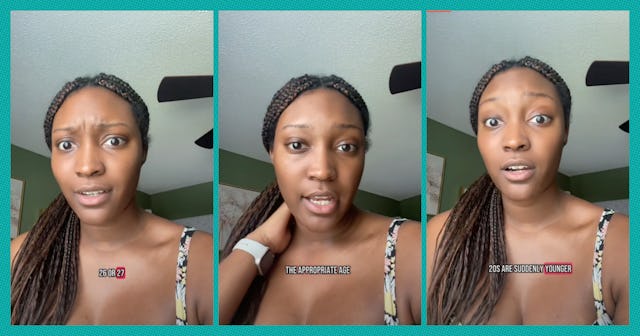Who Counts As A "Young Mom" These Days?
“Just because people are waiting later doesn’t mean people in their late 20s are suddenly younger.”

Over the past 25 years, first time moms in the United States have gotten older. In 1999, a woman could expect to have her first child around 24.5 years old. In 2024, that number was up to 27.5 years old. There are a lot of factors that go into that rise, from economic considerations to more women pursuing higher education, to general vibe shifts of women saying “Eh, let’s hold off for a bit and have a breezier 20s than my mom had in the ’90s.” But TikTok creator and new mom Jordan Simone wants to know: “What is the appropriate age to be a parent now? When are you no longer a ‘young parent’ and just a parent?”
Simone says, for her, she imagines someone newly in their 20s, “a step removed from teen pregnancy.” But that’s not what she’s noticing among her friends: “The people y’all talk about when you say ‘young parent’ are ... pushing 30.”
“I know that the way the economy is right now still makes us feel really young,” she continues. “A lot of us still live with our parents or don’t have the jobs or the job security that we want ... but the reality is that I thought the average age for people having kids is, like, 26 or 27.”
A little over 27, as we mentioned. This average can certainly vary by location — women tend to have children later on in Connecticut, for example, than Alabama — but broadly speaking late-20s seems to be the first-time-mom sweet spot these days. But, says Jordan...
“Just because people are waiting later doesn’t mean people in their late-20s are suddenly younger,” she says. “I don’t know if that’s a ‘young pregnancy’ anymore.”
I have some experience in this arena. About 13 years ago, I had the dubious honor of being the first of my friends to have a baby. And let me tell you: it’s weird. We always joked that by New York City standards, where people tend to get married a bit later in life than the national average, I was a 24-year-old child bride. When I had my son four years later, that sense of being too young to be doing adult things did not abate. We joked that I was an almost-30-year-old teen mom. My husband and I felt like we were getting away with something when the hospital discharged us. Like “We are literal children and you’re just going to let us keep this baby? Shouldn’t you involve the Department of Family Services?”
And of course that’s absurd. I was fully an adult, but 28 still felt young in some ways. Opinions on this topic ran the gamut in the comments.
“Young is up to 22 IMO,” said one commenter. “Basically anything before a typical undergrad age. Fairly young is 23 to 27. The frontal lobe is finishing its bake. I don't think being fairly young is terrible, just a descriptor.”
“In the social circles I grew up in, anything under 30 was viewed as a teen pregnancy. Most have their first kid at 35,” observed another. “But over 30 is just accepted as being a normal aged parent.”
“I was 25 having my first and I've joked about being an ‘older’ mom because, well, I live in Utah,” joked a third.
Clearly there’s a lot that factors into this assessment — where you live, how you were raised, etc. —and yet relative to past generations, I think this feeling of arrested development is a very Millennial/Gen-Z experience. A lot of us don’t feel like adults so much as two 6 year olds in a trench coat pretending to be adults.
Of course, I’m sure a lot of our parents will tell us that when it comes to babies no one is ever truly ready— that babies make all new parents feel young and inexperienced. Fortunately, babies are even younger and less experienced so we can fake it for them until we find our sea legs.